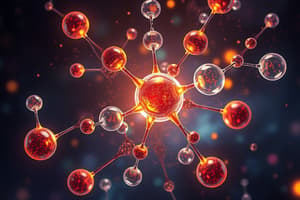Podcast
Questions and Answers
What is the theory of Vitalism in organic chemistry?
What is the theory of Vitalism in organic chemistry?
- Organic compounds contain no carbon atoms
- Organic compounds can only be produced by living organisms (correct)
- Organic compounds can be produced by non-living processes
- Organic compounds are strictly synthetic in nature
What type of bonds are present in hydrocarbons?
What type of bonds are present in hydrocarbons?
- Carbon-sulfur and carbon-nitrogen bonds
- Carbon-carbon and carbon-oxygen bonds
- Carbon-phosphorous and carbon-halogen bonds
- Carbon-carbon and carbon-hydrogen bonds (correct)
Why are hydrocarbons poor conductors of electricity?
Why are hydrocarbons poor conductors of electricity?
- Due to their high boiling points
- Containing aromatic structures
- Being nonpolar molecules (correct)
- Because they contain only carbon atoms
Where are most hydrocarbons deposited beneath the Earth's surface?
Where are most hydrocarbons deposited beneath the Earth's surface?
What is the maximum number of covalent bonds carbon can form with other carbon atoms?
What is the maximum number of covalent bonds carbon can form with other carbon atoms?
What is the main component of a plant cell wall?
What is the main component of a plant cell wall?
Why were some compounds called 'aromatic' in early chemistry?
Why were some compounds called 'aromatic' in early chemistry?
Which polysaccharide serves as an energy reserve in animals?
Which polysaccharide serves as an energy reserve in animals?
What is the function of glycoproteins in cells?
What is the function of glycoproteins in cells?
Which carbohydrate is known as blood sugar?
Which carbohydrate is known as blood sugar?
What type of carbohydrate has 2-10 monosaccharide units?
What type of carbohydrate has 2-10 monosaccharide units?
Which carbohydrate has many monosaccharide units (thousands)?
Which carbohydrate has many monosaccharide units (thousands)?
What is the hardest natural substance known on earth?
What is the hardest natural substance known on earth?
Which allotrope of carbon has no definite arrangement and includes examples like soot and charcoal?
Which allotrope of carbon has no definite arrangement and includes examples like soot and charcoal?
What are Fullerenes commonly known as due to their resemblance to tiny soccer balls?
What are Fullerenes commonly known as due to their resemblance to tiny soccer balls?
Who was Fullerene named after?
Who was Fullerene named after?
What is the maximum number of bonds carbon can form?
What is the maximum number of bonds carbon can form?
Which of the following is NOT a property of carbon?
Which of the following is NOT a property of carbon?
What is the main monomer of carbohydrates?
What is the main monomer of carbohydrates?
Which elements together constitute about 90% of the dry weight of the human body?
Which elements together constitute about 90% of the dry weight of the human body?
What is the most abundant and concentrated source of usable energy in the body?
What is the most abundant and concentrated source of usable energy in the body?
Which organic compounds are classified according to size as monosaccharides, disaccharides, or polysaccharides?
Which organic compounds are classified according to size as monosaccharides, disaccharides, or polysaccharides?
What is the main component of lipids that makes them insoluble in water?
What is the main component of lipids that makes them insoluble in water?
Which group of compounds includes nucleic acids, proteins, polysaccharides, and lipids?
Which group of compounds includes nucleic acids, proteins, polysaccharides, and lipids?
Which functional group is present in an aldose?
Which functional group is present in an aldose?
What is the common term used for D-galactose and D-glucose differing only in the configuration of the –OH group on carbon #4?
What is the common term used for D-galactose and D-glucose differing only in the configuration of the –OH group on carbon #4?
Which sugar is often referred to as 'brain sugar'?
Which sugar is often referred to as 'brain sugar'?
What kind of sugars give a positive test with tollens and benedict’s solutions?
What kind of sugars give a positive test with tollens and benedict’s solutions?
Which compound is essential for RNA and energy-rich compounds like ATP?
Which compound is essential for RNA and energy-rich compounds like ATP?
What type of bond is found in cellobiose?
What type of bond is found in cellobiose?
'Losing Electron is Oxidation' relates to which compound transformation?
'Losing Electron is Oxidation' relates to which compound transformation?
'Gaining Electron is Reduction' relates to the transformation of:
'Gaining Electron is Reduction' relates to the transformation of:
'Deoxy' in 2-deoxy-d-Ribose means:
'Deoxy' in 2-deoxy-d-Ribose means:
'Hemiacetal + Alcohol' leads to the formation of a(n):
'Hemiacetal + Alcohol' leads to the formation of a(n):
Flashcards are hidden until you start studying




